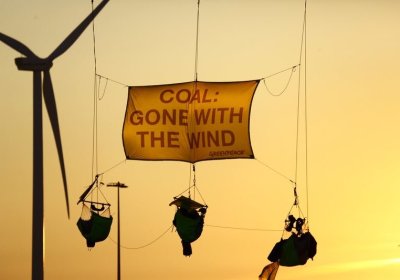Newcastle youth Ceder locked on to the side of a coal train in Newcastle, halting all supply heading into the world's largest coal port on September 7. Ceder was later cut loose and taken into police custody. This was the third protest action this week organised by Frontline Action on Coal against Australia’s coal industry and its contribution to global climate change.
Coal
Newcastle Police arrested a young man and woman for filming a peaceful protest on September 3, along with Sarah Barron, a Newcastle local, who had blocked all coal trains heading across Sandgate bridge for three hours. All three were taken into custody by around a dozen police, with the two who filmed the event being charged with “aiding and abetting”.
Barron was participating in “Act Up Newcastle” as part of the #EndCoal campaign initiated by Climate Justice group Frontline Action on Coal (FLAC), in collaboration with Newcastle Climate Justice Uprising.
In recent weeks the coal lobby has launched a renewed propaganda offensive, including Pauline Hansen offering support for Coalition tax legislation in exchange for a new coal-fired power station in North Queensland and former Prime Minister Tony Abbott calling for government funding for new coal-fired power stations.
Dozens of creative and disruptive actions were held across Australia under the banner of “drawing a red line” on new coal. Organised by Front Line Action on Coal (FLAC) and local Stop Adani groups, people from Auckland to Melbourne and many regional communities protested outside politicians’ offices, dropped banners over freeways and blockaded coal train lines.
Polls show more than 55% of Australians oppose the Adani coalmine, with about 70% opposing government financial support for it.
The Ngara Institute’s annual Activist of the Year award was shared by the Knitting Nannas Against Gas, whose creative and persistent nonviolent strategies have been so important at blockades and protests, and Annie Kia, who developed the hugely successful “neighbour to neighbour” community engagement process for Lock the Gate.
The award was presented on June 30 at Ngara’s annual lecture in Mullumbimby, presented by former Human Rights Commissioner Gillian Triggs.
Activists opposed to the opening up of coalmining in Queensland’s Galilee Basin have taken to the streets in local actions calling on Coalition and Labor MPs to stop the Adani coalmine from going ahead.
On May 18, activists in Ballarat protested outside the local MPs office and on May 19 more than 200 gathered outside the Camberwell office of environment minister Josh Frydenberg. Rallies were also held in Brisbane and Adelaide.
Information provided by the NSW Water Office indicates that if the Bylong coalmine in the Upper Hunter region proceeds, there is a real danger of the Bylong River and local creeks drying up.
The Bylong coalmine, a project of South Korean government-owned company Kepco which supplies coal to the electricity industry, involves open cut and underground extraction of up to 6.5 million tonnes of coal for a period of 25 years. The Planning and Assessment Commission’s hearing of Kepco’s application was completed in May last year and its review report was completed in July.
Since the project was first proposed in October 2010, Adani’s Carmichael coalmine, rail and port project has generated opposition, initially from local resident and conservation groups.
The Carmichael project is one of several of mines proposed for the Galilee Basin. GVK Hancock (Gina Rinehart’s joint venture with Indian company GVK) proposed Alpha Coal in September 2008 and Kevin’s Corner in August 2009. Clive Palmer applied for approval for Waratah Coal in October 2008.
The Supreme Court in Brisbane on May 2 overturned the Land Court decision of May 31 last year that recommended rejection of the stage 3 expansion of the New Acland (NAC) coalmine on Queensland's Darling Downs.
On February 14, the Department of Environment and Science refused the application for an amended environmental authority to allow for Stage 3, however the minister deferred a decision pending the outcome of the judicial review.
For more than 20 years, locals on the NSW Central Coast have been fighting a proposed coalmine in the Dooralong and Yarramalong valleys near Wyong.
The area is an important part of the drinking water catchment for more than 300,000 people, and the proposed Wallarah 2 longwall coalmine threatens to take millions of litres of water each year out of the catchment and pollute local waterways.
Research commissioned by Environment Victoria shows that 12 months after the highly polluting Hazelwood power station closed, Victoria has a reliable electricity system and less climate pollution.
“If we want to look after people and the land as we repower New South Wales [with renewable energy] we have to fight for it”, George Woods from Lock the Gate told a large rally of First Nations people, farmers and city-dwellers who took over Martin Place near NSW Parliament on March 24.
- Previous page
- Page 9
- Next page











